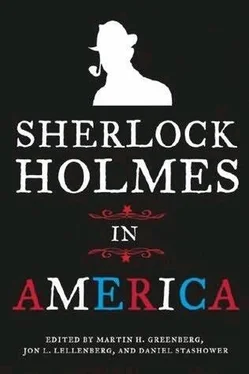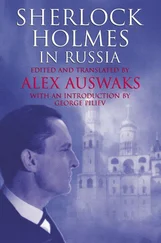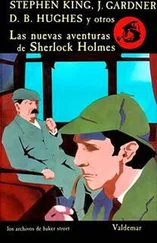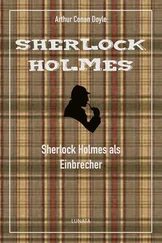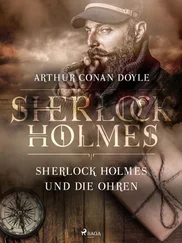I merely nodded at that. I did not have to ask Holmes what he meant. More than once he had expressed his opinion that the wild tales of Buffalo Bill, as related by Mr. Buntline and Mr. Ingraham, contained no more excesses than those I myself composed about him.
“While you did not hear about Mudgett while we were visiting the White City,” I said, “you did find opportunity to exercise your skills in the service of good.”
Holmes smiled a thin smile. “Ah, Watson. While you know my methods, I know yours. You are ever on the alert for something with which to fill your notebooks, some item you can later spin into a tale of adventure for your readers.”
I laughed. “You have caught me out, Holmes, for that was indeed the very thought that crossed my mind. We are even, then, for I have read your thoughts, and you have read mine. I should very much like to tell of our American adventure some day.”
“I do not believe the events of the story will be of interest to your readers, as they occurred so far away.”
“Even in America there are many who know of you,” I replied.
“Very well,” said Holmes. “Perhaps in later years you will find occasion to tell the story.”
And so at last I have.
After the bizarre affair at Wisteria Lodge, the idea of a trip to the White City to see “the highest and best achievements of modern civilization” had a great appeal to Holmes and me. We were certain that the sight of the Exposition’s grounds would be one to inspire even the dullest of souls.
Surprisingly enough, Buffalo Bill’s Wild West show was not a part of the fairgrounds. Colonel Cody had, I believe, wanted to be a part of the Exposition, but he was denied the privilege. He was too much of a showman, however, to let that stop him. He simply set up his tents just outside the grounds, taking up several blocks with his campgrounds and arena. His extravagant advertisements promised to introduce his “Congress of Rough Riders,” with more than 450 horses, ridden by vaqueros, Cossacks, gauchos, Indians, cowboys, and more.
“Buffalo Bill’s Wild West will be a show on a grand scale,” Holmes remarked as we prepared to leave our hotel on the morning after our arrival in Chicago. “Even grander than the one presented before the queen.”
“Perhaps we shall see the battle of the Little Big Horn enacted once again,” said I, recalling a particularly exciting moment.
Just then there came a knock upon the door. Holmes’s eyes widened, and I confess that I was startled. I had not heard the sound of anyone approaching, and I was certain that the same was true of Holmes, who rose and went to the door.
He stopped with his hand on the knob and said, “Colonel Cody, I presume.”
Then Holmes opened the door to reveal the great showman standing there. He wore a wide-brimmed grey felt hat, black coat and britches, and western boots. His hair, moustache, and goatee were shot through with grey, and his piercing gaze lighted on Holmes’s face.
“Mr. Holmes,” Cody said, sweeping off his hat, “it is a pleasure to see you again. But how did you know who I was before you even opened the door?”
“Who else in this city but the great scout of the plains could move so silently through the corridors of the hotel that no one could hear him?”
Cody had turned his right ear slightly toward Holmes to hear the answer, and Holmes touched his nose surreptitiously so that only I could see. I ascertained his meaning, as I smelled the faintest odor of livestock, a clue that I felt we need not mention to Cody.
“I guess that’s so,” Cody said with a smile.
Holmes gestured him inside. “You remember Dr. Watson, I am sure.”
Cody said that he did, and shook hands with me in his frank American way. After the re-introduction, Holmes offered him a chair. Cody sat down, both feet planted on the floor, his hands clasping his knees as he leaned slightly forward. He was about to speak, but Holmes raised a hand to stop him.
“Before you tell us why you have come to visit,” Holmes said, “I would like to know how you learned we were in Chicago.”
“Easy enough,” Cody said. “I saw it in the newspaper.” I suppressed the urge to tell Holmes that the article proved I was right about his being known in North America.
“Ah,” Holmes said, with a glance in my direction as if to say he knew my thoughts. “I suppose some reporter or other noted our arrival at the railway station.”
“Must have,” Cody said, “and then he jotted it down in time for the late edition. As soon as I saw it, I decided to track you down.”
Holmes walked across the room and rested his shoulder against the chimneypiece. “Not as difficult as tracking on the plains, I imagine,” said he. “But you did not come here to talk about tracking.”
“No,” Cody said. “I came to ask for help.”
Holmes took his pipe and the Persian slipper, brought all the way from England on our journey, from the chimneypiece. He filled his pipe with tobacco from the slipper, and when he had made sure the pipe was lighted to his satisfaction, he said, “I am not surprised to hear it. A man with your duties and responsibilities at this moment would not come merely for a visit. What is the nature of the problem?”
Cody leaned further forward as if to express his earnestness. “It’s not real easy to explain. Have you heard that one of the exhibits here at the Exposition is Sitting Bull’s cabin?”
Holmes looked in my direction. Taking my cue, I said, “We have read of it, but have not yet strolled the Midway. I believe there will be a daily ‘war dance’ performed at the site. It is, if you will permit me to say so, not unlike something from your own show.”
“It sure is,” said Cody. “Some folks might even see it as some kind of conflict, but that’s not the problem.”
“The problem has to do with the cabin, however,” said Holmes.
“It does. I believe somebody wants to destroy it.”
“But why?” said I. “And how?”
“How? Well, the plan is to burn it. Why? That’s hard to say. Some people never have forgiven Sitting Bull for his part in the Custer massacre, and even his death at the hands of the Lakota police didn’t end their desire for revenge. To destroy his cabin would be one way of striking at him even though he’s dead.” Cody sighed. “There’s more to it than that, though. If the cabin’s destroyed, at least some of the blame will fall on me and people in my show. Sitting Bull was with me for a little while, and even now I have some Indian performers that the government and a lot of the rest of the country would prefer to have living on the reservations. Destroying the cabin would be an act of revenge, and it would make me and my performers look bad.”
“Have you informed the police?” I asked.
“Certainly,” Cody said, “but I have a feeling they’re not up to the job.”
Holmes nodded his assent and added, “Their forces are spread too thin with the Exposition and all its visitors. It would be difficult for them to mount a twenty-four-hour guard on an exhibit on the basis of a rumor.”
“It’s no rumor,” Cody said. “I’m sure of that.”
“Then how did you come to hear of it?” asked Holmes.
“From Annie Oakley and Frank Butler. They overheard two men talking. One of them said, ‘Burn Sitting Bull’s cabin.’ Butler says he heard him distinctly, and he heard the other agree. The voices came from behind a row of tents. Naturally, Butler ran down to the end of the row, but by the time he got there, the men had disappeared, lost in the crowd of people who work on the show. There are hundreds of them.”
“And no one else overheard the conversation?” said Holmes.
“No one. The nearby tents were deserted, and it’s a wonder that Butler happened to hear, considering the noise of the camp. Can you help me, Mr. Holmes, or do I need to go to somebody else?”
Читать дальше
